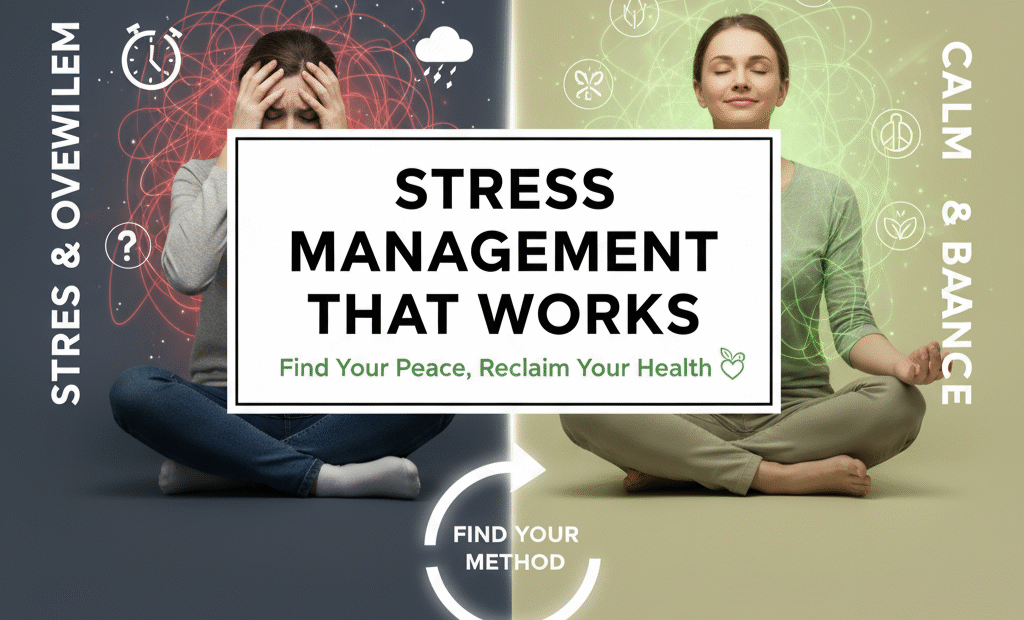Stress Management That Works
In today’s fast-paced world, stress is something everyone experiences. While some stress can be motivating, too much of it can affect your health, mood, and overall well-being. The key isn’t to eliminate stress completely — that’s impossible — but to manage it effectively. By adopting practical habits, you can control how you respond to life’s challenges and build resilience for the long run.
Understanding Stress
Stress is your body’s natural response to pressure or danger. It triggers the “fight or flight” reaction, releasing hormones like cortisol and adrenaline. Short bursts of stress can help you stay alert and focused, but chronic stress can lead to fatigue, anxiety, sleep problems, and even weakened immunity. Recognizing the early signs of stress is the first step toward managing it.
Common Signs of Stress
- Frequent headaches or muscle tension
- Difficulty concentrating or making decisions
- Changes in appetite or sleep patterns
- Feeling overwhelmed, anxious, or irritable
- Increased use of caffeine, alcohol, or smoking
Effective Stress Management Strategies
Managing stress effectively requires both mental and physical strategies. Here are proven techniques that can help you calm your mind and restore balance.
1. Practice Deep Breathing
Deep breathing exercises are one of the fastest ways to reduce stress. Slow, controlled breathing sends a signal to your brain to relax. Try the “4-7-8” method: inhale for four seconds, hold for seven, and exhale for eight. Repeat several times whenever you feel tense.
2. Exercise Regularly
Physical activity releases endorphins — natural mood boosters that fight stress. You don’t need to hit the gym; even a short walk, yoga session, or dancing to your favorite music can help you unwind and recharge.
3. Get Enough Sleep
Lack of sleep increases irritability and makes stress harder to manage. Aim for 7–8 hours of sleep each night. Establish a bedtime routine, avoid screens before bed, and keep your room dark and cool to promote restful sleep.
4. Practice Mindfulness or Meditation
Mindfulness teaches you to stay present instead of worrying about the future or dwelling on the past. Try spending 10 minutes daily focusing on your breath or using guided meditation apps. This helps quiet your thoughts and promotes inner calm.
5. Stay Connected
Talking to friends or family about what you’re going through can make a huge difference. Social support is one of the strongest buffers against stress. Don’t be afraid to ask for help — you don’t have to face challenges alone.
6. Manage Your Time Wisely
Feeling overwhelmed often comes from having too much to do. Prioritize your tasks, set realistic goals, and break large projects into smaller steps. Learn to say “no” when your schedule is full — your mental health is more important than pleasing everyone.
7. Take Breaks and Disconnect
Constantly being “on” can lead to burnout. Schedule regular breaks during work, step outside for fresh air, or unplug from digital devices for a few hours. These moments of rest refresh your mind and boost productivity.
Healthy Lifestyle Habits to Reduce Stress
- Eat a balanced diet rich in fruits, vegetables, and whole grains.
- Limit caffeine and alcohol, which can heighten anxiety.
- Stay hydrated throughout the day.
- Engage in hobbies that bring joy — music, art, or gardening.
When to Seek Professional Help
If you find that stress is constant, overwhelming, or interfering with your daily life, consider talking to a mental health professional. Therapy, counseling, or support groups can provide valuable tools and perspectives for managing stress more effectively.
Conclusion
Stress is a part of life, but it doesn’t have to control you. By practicing mindfulness, staying active, and maintaining healthy habits, you can manage stress and improve your overall quality of life. Remember, small daily actions can make a big difference. Start today — breathe deeply, slow down, and take care of your mind and body.







